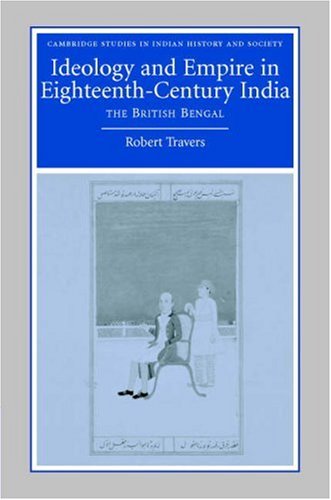Robert Travers0521861454, 9780521861458
Table of contents :
Cover……Page 1
Half-title……Page 3
Series-title……Page 4
Title……Page 5
Copyright……Page 6
Contents……Page 7
Preface and acknowledgements……Page 9
Abbreviations and note on currency……Page 13
Note on currency……Page 14
Glossary of Indian terms……Page 15
Introduction……Page 21
1 Imperium in imperio: the East India Company, the British empire and the revolutions in Bengal, 1757-1772……Page 51
The connected worlds of the East India Company……Page 52
The terms of negotiation……Page 63
This happy revolution?……Page 75
2 Colonial encounters and the crisis in Bengal, 1765-1772……Page 87
Contesting power in Murshidabad……Page 93
Power in the districts……Page 105
Conclusions: crisis and nostalgia……Page 118
3 Warren Hastings and ‘the legal forms of Mogul government’, 1772-1774……Page 120
Governor Hastings in context……Page 121
A revolution in sovereignty……Page 127
Standing forth……Page 130
The ancient constitution of law……Page 135
Questions to the natives and the custom of the country……Page 146
The reinvention of Mughal government: courts, criminals and the police……Page 152
Conclusion……Page 158
4 Philip Francis and the ‘country government’……Page 161
‘To act generally for the nation’……Page 163
Gathering materials……Page 170
Competing visions……Page 183
Conclusion: the shifting ground of British Indian politics……Page 197
5 Sovereignty, custom and natural law: the Calcutta Supreme Court, 1774-1781……Page 201
A new court for Bengal……Page 202
The Supreme Court and British sovereign authority……Page 205
The ‘Patna cause’: natural justice for India……Page 211
From Patna to parliament: confusing outcomes……Page 220
Conclusion……Page 225
6 Reconstituting empire, c. 1780-1793……Page 227
The crisis of war and the Pittite resolution……Page 228
The Mughal constitution on trial……Page 234
The decline of the country government……Page 243
Towards a new constitution for Bengal……Page 253
The selective memory of colonial enlightenment……Page 264
7 Epilogue……Page 270
Northumberland county record office, melton park, gosforth……Page 274
Published sources before c. 1850……Page 275
Printed primary sources……Page 276
Secondary sources……Page 277
Unpublished doctoral dissertations……Page 288
Index……Page 289
Other titles in the series……Page 295

Reviews
There are no reviews yet.